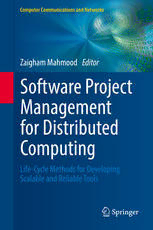
Software Project Management for Distributed Computing: Life-Cycle Methods for Developing Scalable and Reliable Tools PDF
Preview Software Project Management for Distributed Computing: Life-Cycle Methods for Developing Scalable and Reliable Tools
Computer Communications and Networks Zaigham Mahmood Editor Software Project Management for Distributed Computing Life-Cycle Methods for Developing Scalable and Reliable Tools Computer Communications and Networks Serieseditor A.J.Sammes CentreforForensicComputing CranfieldUniversity,ShrivenhamCampus Swindon,UK The Computer Communications and Networks series is a range of textbooks, monographs and handbooks. It sets out to provide students, researchers, and non- specialists alike with a sure grounding in current knowledge, together with comprehensibleaccesstothelatestdevelopmentsincomputercommunicationsand networking. Emphasis is placed on clear and explanatory styles that support a tutorial approach, so that even the most complex of topics is presented in a lucid and intelligiblemanner. More information about this series at http://www.springer.com/series/4198 Zaigham Mahmood Editor Software Project Management for Distributed Computing Life-Cycle Methods for Developing Scalable and Reliable Tools Editor ZaighamMahmood DepartmentofComputingandMathematics UniversityofDerby Derby,UK ShijiazhuangTiedaoUniversity Hebei,China ISSN1617-7975 ISSN2197-8433 (electronic) ComputerCommunicationsandNetworks ISBN978-3-319-54324-6 ISBN978-3-319-54325-3 (eBook) DOI10.1007/978-3-319-54325-3 LibraryofCongressControlNumber:2017935573 ©SpringerInternationalPublishingAG2017 Thisworkissubjecttocopyright.AllrightsarereservedbythePublisher,whetherthewholeorpartof the material is concerned, specifically the rights of translation, reprinting, reuse of illustrations, recitation, broadcasting, reproduction on microfilms or in any other physical way, and transmission or information storage and retrieval, electronic adaptation, computer software, or by similar or dissimilarmethodologynowknownorhereafterdeveloped. The use of general descriptive names, registered names, trademarks, service marks, etc. in this publicationdoesnotimply,evenintheabsenceofaspecificstatement,thatsuchnamesareexempt fromtherelevantprotectivelawsandregulationsandthereforefreeforgeneraluse. Thepublisher,theauthorsandtheeditorsaresafetoassumethattheadviceandinformationinthis book are believed to be true and accurate at the date of publication. Neither the publisher nor the authors or the editors give a warranty, express or implied, with respect to the material contained hereinor for anyerrors oromissionsthat may havebeenmade. Thepublisher remainsneutralwith regardtojurisdictionalclaimsinpublishedmapsandinstitutionalaffiliations. Printedonacid-freepaper ThisSpringerimprintispublishedbySpringerNature TheregisteredcompanyisSpringerInternationalPublishingAG Theregisteredcompanyaddressis:Gewerbestrasse11,6330Cham,Switzerland To Zayb-un-Nisa Khan On Her First Birthday, With Best Wishes and Prayers for a Long, Contented and Happy Life Preface Overview SoftwareProjectManagement(SPM)isasubdiscipline ofprojectmanagementin which software projects are planned, engineered, implemented and monitored. In orderthatsoftwareproductsaredeliveredontime,withintheallocatedbudgetsand fullyconformingtotheuserrequirements,itisimperativethatsoftwareprojectsare appropriately designed, managed and well executed, especially if these relate to complexsoftwaresystems.ManySPMparadigmshavebeensuggestedinthepast and successfully employed in recent years; however, with the advancement in computing technologies, including cloud computing, distributed computing and the Internet of Things, the existing frameworks and management approaches do notnecessarilysatisfactorilyapply.Thereisnowarequirementforsoftwaretobe scalable,sustainableandsuitablefordistributedcomputingenvironments.This,in turn,suggestsarequirementformanagementmethodswithevolutionarylifecycles and software engineering approaches that take into account distributed working practices and distributed team management working in virtual operating environ- ments.ItisforthisreasonthatSPMisbecominganimportantresearchtopicinthe fieldofsoftwareengineering. Inrecentyears,numerousnewerapproachesandtoolsforthedevelopmentand management of software products and projects have been suggested, some being deployedwithsomedegreeofsuccesstosatisfytherequirementsofscalabilityand multi-tenancy. However, the research must continue to fully satisfy the require- mentsasbrieflymentionedabove. With this background, the current volume, Software Project Management for DistributedComputing:Life-CycleMethodsforDevelopingScalableandReliable Tools,aimstoinvestigatethelatestmanagementapproachestodevelopingcomplex softwarethatisefficient,scalable,sustainableandsuitablefordistributedenviron- ments.Thefocusisprimarilyonnewermethodologieswithrespecttomanagement processes. Emphasis is also on the use of latest software technologies and vii viii Preface frameworks for the life-cycle methods including design, implementation and test- ingstagesofthesoftwaredevelopment. Hopefully,thistextwillfillagapintheSPMliteratureandpracticebyproviding scientificcontributionsfromresearchersandpractitionersofinternationalreputein the fields of management and software engineering. Thirty-six authors have presented latest research developments, frameworks and methodologies, current trends,state-of-the-artreports,casestudiesandsuggestionsforfurtherunderstand- ing, development and enhancement of management approaches for developing scalableandmulti-tenantcomplexsoftware. Objectives The aim of this volume is to present and discuss the state of the art in terms of frameworks and methodologies for software project management for distributed computing environments. The features that set this book apart from others in the fieldinclude: • Latestresearch,developmentandfuturedirectionsintheproposedsubjectarea ofsoftwareprojectmanagement(SPM) • Case studies describing challenges, best practices and solutions for SPM for distributedcomputingenvironments • Textbook and complete reference for students, researchers, practitioners and projectmanagersinthesubjectareaofSPM • Alignment of software engineering frameworks with SPM approaches using latesttechnologies • Corporateanalysispresentingabalancedviewdiscussing benefitsandinherent issues Organization Thereare15chaptersinSoftwareProjectManagementforDistributedComputing: Life-Cycle Methods for Developing Scalable and Reliable Tools. These are orga- nizedinthreepartsasfollows: • Part I: Characteristics and Estimation of Software Projects for Distributed Computing. This section has a focus on characteristics, perspectives and estimation approaches. There are five chapters in this part of the book. The first two chapters discuss the modelling of reusability and estimation of cost andtimefordistributedsoftwaredevelopmentprojects.Thefocusofthethird contribution in the section is on functional size measurement of distributed softwareapplications,andthefourthchapterdiscussesthecorecharacteristics of large-scale defence-related software projects. The fifth contribution Preface ix introduces and presents software project management (SPM) as a distributed service:SPMaaS. • Part II: Approaches and Frameworks for Software Development and Software Project Management. This part of the book also comprises five chapters that focus on frameworks and methodologies. The first contribution presents component-based reference architecture for embedded software development. The next chapter proposes a 3PR framework for SPM based on people, pro- cesses, products and risks, while the third contribution discusses a novel crowdsourcing approach for software development. The fourth contribution presents a migration and management approach for distributed environments. The fifth chapter investigates a novel approach for modelling of large-scale multi-agentsoftwaresystems. • Part III: Advances in Software Project Management and Distributed Software Development.Therearefivechaptersinthissectionaswellthatfocusonlatest developmentsinSPMandsoftwaredevelopmentfordistributedcomputing.The firstcontributiondiscussesanerrorpronenessmechanismbasedonbirdmating algorithm.ThenextchapterpresentsanovelScrumprocessrelevanttodefence and security domain. The third chapter is on ontology annotation for SPM for distributed computing environments. The fourth contribution investigates the scope of Agile project management in an educational setting, while the final chapter in the book focusses on SPM for combined software and data engineering. Target Audiences The current volume is a reference text aimed at supporting a number of potential audiences,includingthefollowing: • Project managers and software engineers who wish to deploy the newer approaches and technologies to ensure the development of software that is scalable,sustainableandsuitablefordistributedcomputingenvironments • Studentsandlecturerswhohaveaninterestinfurtherenhancingtheknowledge oftechnologies,mechanismsandframeworksrelevanttosoftwareprojectman- agement(SPM)fromadistributedcomputingperspective • Researchers in this field who require up-to-date knowledge of the current practices, mechanisms and frameworks relevant to SPM, to further extend the bodyofknowledgeinthisfield Derby,UK ZaighamMahmood Hebei,China Acknowledgements The editor acknowledges the help and support of the following colleagues during thereview,developmentandeditingphasesofthistext: • JosipLorincz,FESB-Split,UniversityofSplit,Croatia • Dr.N.Maheswari,SchoolCS&Eng,Chennai,TamilNadu,India • AleksandarMilic´,UniversityofBelgrade,Serbia • Dr.S.Parthasarathy,ThiagarajarCollegeofEng,TamilNadu,India • DanielPop,Institutee-AustriaTimisoara,WestUniv.ofTimisoara,Romania • Dr.PethuruRaj,IBMCloudCenterofExcellence,Bangalore,India • Dr.MuthuRamachandran,LeedsBeckettUniversity,Leeds,UK • Dr.LucioAgostinhoRocha,StateUniversityofCampinas,Brazil • Dr.SaqibSaeed,UniversityofDammam,SaudiArabia • Dr.MahmoodShah,UniversityofCentralLancashire,Preston,UK • Dr.FareehaZafar,GCUniversity,Lahore,Pakistan I would also like to thank the contributors of this book: 36 authors and co-authors,fromacademiaaswellasindustryfromaroundtheworld,whocollec- tivelysubmitted15chapters.Withouttheireffortsindevelopingqualitycontribu- tions,conformingtotheguidelinesandmeetingoftenthestrictdeadlines,thistext wouldnothavebeenpossible. Grateful thanks are also due to the members of my family – Rehana, Zoya, Imran, Hanya, Arif and Ozair – for their continued support and encouragement. Every good wish, also, for the youngest in our family: Eyaad Imran Rashid Khan andZayb-un-NisaKhan. DepartmentofComputingandMathematics ZaighamMahmood UniversityofDerby Derby,UK ShijiazhuangTiedaoUniversity Hebei,China xi
